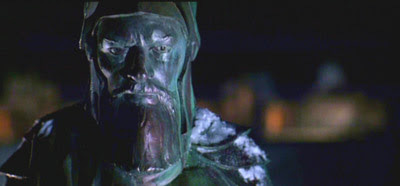Reading Shakespeare’s Hamlet (#1)
An accessible discussion of Shakespeare’s Hamlet (Blog 1) (Act 1, Scene 1)
Shakespeare’s play opens on a high platform of the Danish royal castle at Elsinore, a port city in eastern Denmark.
Francisco, a castle guard, is keeping watch when Barnardo enters to relieve him. The night is cold and you’d need a sashimi knife to cut the tension.
Barnardo:
Who’s there?
Barnardo pitches up to replace Francisco but the interrogatory roles are reversed. Given that Francisco is on guard, it should be him interrogating any unknown arrivals, not the other way around. The fact that Barnardo interrogates Francisco does a couple of things. It tells us that visibility is poor. Perhaps there is a heavy mist in the air (some productions have interpreted the scene as such), perhaps the night is unusually dark. Whatever the reason, the limited visibility creates an air of fear and suspense.
It is also worth noting that the play opens with a question. A question implies uncertainty. We are in one of the most secure and wealthy places in the world, yet the kingdom’s guards are on edge. Something is afoot in this here land…
Finally, Barnardo’s question may concern something he has seen on a previous night. Is he fearful of a ghost perchance?
Francisco:
Nay, answer me. Stand and unfold yourself.
‘Unfold yourself’ means ‘identify yourself’. As previously addressed, Francisco is the guard on duty, he should be the one asking the questions. So he asserts himself, forcing Barnardo to reveal his identity.
Barnardo:
Long live the king!
Francisco:
Barnardo?
Barnardo:
He.
Francisco:
You come most carefully upon your hour.
‘Coming carefully upon your hour’ means that Barnardo is ‘considerately on time’. When I first read this I thought it meant Francisco had turned up late, that he was a relaxed guard with a carefree attitude to ‘the hour’. Not so! He’s turned up at precisely the right time.
Barnardo:
‘Tis now struck twelve. Get thee to bed, Francisco.
In folklore, the hour following midnight is the ‘witching hour’, a time when supernatural events occur, when demons, witches and ghosts emerge.
Francisco:
For this relief much thanks. ‘Tis bitter cold,
And I am sick at heart.
This ‘heart sickness’ is interesting. Until now the exchange has been blunt and efficient. By sharing his emotions in this way, Francisco muddies the waters of the disciplined military context. Something is creating disturbances in the story world, but what? It prompts a subtle enquiry from Barnardo.
Barnardo:
Have you had quiet guard?
He is putting out feelers. He is too afraid to ask about ghosts or apparitions directly…
Francisco:
Not a mouse stirring.
Although this statement, ‘Not a mouse stirring’, should comfort Barnardo and the audience, it in fact has the opposite effect. In this context it is deeply concerning, the quiet before the storm.
Barnardo:
Well, good night.
If you do meet Horatio and Marcellus,
The rivals of my watch, bid them make haste.
‘Rivals of my watch’ means ‘partners of my watch’. With the ‘bid them make haste’, Barnardo implies that he does not want to stay on watch alone a moment longer than he must.
Horatio (Hamlet’s best pal) and Marcellus (a soldier) enter at this point. The fact that the pair arrive just as Barnardo enquires about their whereabouts contributes to the feeling of surprise, tension and blind spots. People are turning up randomly. Barnardo is a castle guard, he should know if someone is approaching.
For some of the history and analysis I draw from Penguin’s edition of Hamlet, specifically the edition with T.J.B. Spencer’s notes. All feedback on my posts is welcome (especially critical feedback, which helps me improve).
For the most thorough and touching production of Hamlet (in my opinion), see Kenneth Branagh’s 1996 film.



By now I read several of your gems. Thank you. I hope we start with Hamlet and keep going. Love it already.
Very enjoyable and enriching. Got an error message on this post though - had to play read post to hear. ? Best wishes